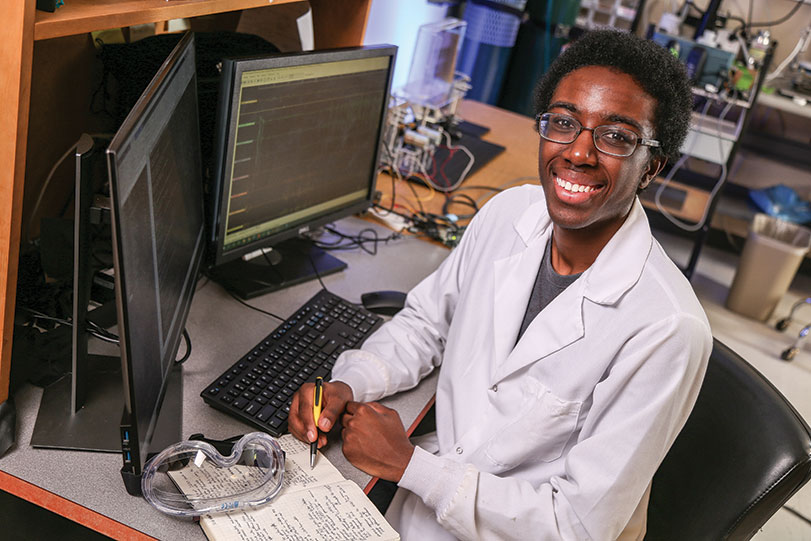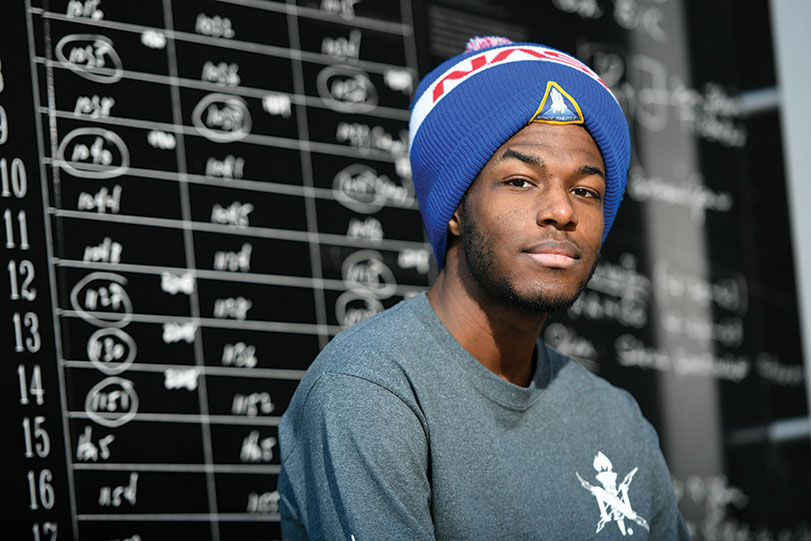Two WUSEF, McKelvey Engineering grads earn research awards
Kyle Thomas and Jonathan Smith, who both took part in undergraduate research programs at the McKelvey School of Engineering, have earned the prestigious Graduate Research Fellowships from the National Science Foundation (NSF)
As well as being alumni of McKelvey Engineering, Thomas and Smith are also alumni of the Washington University Summer Engineering Fellowship (WUSEF).
Each summer, WUSEF hosts a cohort of exceptional students from backgrounds underrepresented in the STEM fields as they work in university labs and learn more about academic research. The goal is to prepare students with the experiences and resources they’ll need to continue in research.
“I started the WUSEF program in 2015 with support from the Engineering school and the Office of the Provost,” said Phil Bayly, the Lee Hunter Distinguished Professor and chair of the Department of Mechanical Engineering & Materials Science. “I built on the examples of the successful summer research programs at the medical school that increased the numbers of students from under-represented groups who applied to medical school at WashU.”
Kyle Thomas took part in the program in 2018 and worked in Bayly’s lab. Jonathan Smith also participated in 2018, performing research in the lab of Kathy Flores, professor of mechanical engineering & materials science and interim chair of the Department of Energy, Environmental & Chemical Engineering.
“Diversity of people encourages diversity of thought,” Smith said. “If there were more diversity in STEM, you probably wouldn’t see so many biases making their way into people’s work. People often don’t think that gender or racial bias get into their work, but it does more than they think.”
Thomas credits his undergraduate research experience with helping him succeed in applying for his fellowship. His experience in the lab led to a publication that he was able to use to strengthen his proposal.

Kyle Thomas, who earned a bachelor’s degree in biomedical engineering in 2019, is a doctoral student studying biomedical engineering at the Georgia Institute of Technology and Emory University, and focusing on understanding how the nervous system allows for motor skill development. Photo by Caroline Joe
“When you’re doing research during the year, you can only give a couple hours a week,” Thomas said. “When you’re working full-time in the summer, you get a lot more done. You get to interact with the graduate students, build off each other’s energy and accomplish more because of that.”
Students are only allowed to apply for a Graduate Research Fellowship twice: once as an undergraduate and once as a graduate student. Both Thomas and Smith applied as graduate students, but Thomas says he regrets not applying sooner.
“I didn’t feel that I was ready, and I didn’t have a project in mind,” he said. “In hindsight that was the wrong way to think about it. I should have submitted something and gotten feedback. Later, I had a chance to present my project idea and get a lot of feedback. I realized I did have all the pieces I needed.”
Smith had already received a fellowship for his first year of study, which provided him with an opportunity to work closely with an adviser to research and draft a proposal.
“Every week, the research I was doing was reading papers and getting a better understanding of the topics so I could talk about them better in the application,” Smith said.

Jonathan Smith, who earned a bachelor’s degree in mechanical engineering in 2020, is a doctoral student studying aerospace engineering and mechanics at the University of Minnesota. His work will apply mathematical concepts from control systems theories to high-speed turbulence for use in aerospace and high-speed vehicles. Photo by Craig Lassig
Smith even had Thomas look through a draft of his application before submitting it.
“I had Kyle look over it for me because I know there’s no guarantee from the NSF that the reviewers will be in your specific area,” he said. “I find it better to be safe than sorry.”
Both Thomas and Smith say they’re grateful for the fellowship, as they won’t have to worry about tuition or funding their research.
“With this support, I can branch out and work on personal goals,” Thomas said. “I want to teach. I could take a semester to design a class or work with high school students. My interest is neuroethics, and I think that’s a good topic to introduce to people before they are involved in the study.”
What advice do they have for students hoping to follow their lead?
“Failing happens, and it’s happened to me a lot of times. It’s important to keep track of when failures happen and why, partly so they don’t happen again and because they can lead to other interesting findings.”
— Kyle Thomas
“Research is very different from most of the things you’re taught in engineering. It’s much more open. You have to figure things out for the sake of figuring things out more so than you’d be expected to in other environments like the classroom.”
— Jonathan Smith

